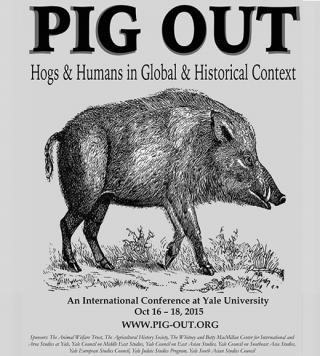 In October, a diverse group of scholars, journalists, farmers and chefs gathered in Henry R. Luce Hall for a three-day interdisciplinary conference on a singular subject: the pig. Jointly convened by Yale’s Program in Agrarian Studies, the Yale Sustainable Food Program, and the Duke University Women’s Studies Program, the conference explored the multifaceted relationships that hogs and humans have developed over the course of history. The pig, as a subject of inquiry, focuses a lens sharply on the evolution of animal-human relations, and on the contemporary ecological, moral, and alimentary implications of these relationships. Key themes considered at the conference included: pig domestication; the markers and taboos of religious identities as expressed in relationship to pork; ethical issues in farming and selling pork and pork products; the role of the pig in various environments such as the city or the garden farm; and representations of pigs in the popular imagination.
In October, a diverse group of scholars, journalists, farmers and chefs gathered in Henry R. Luce Hall for a three-day interdisciplinary conference on a singular subject: the pig. Jointly convened by Yale’s Program in Agrarian Studies, the Yale Sustainable Food Program, and the Duke University Women’s Studies Program, the conference explored the multifaceted relationships that hogs and humans have developed over the course of history. The pig, as a subject of inquiry, focuses a lens sharply on the evolution of animal-human relations, and on the contemporary ecological, moral, and alimentary implications of these relationships. Key themes considered at the conference included: pig domestication; the markers and taboos of religious identities as expressed in relationship to pork; ethical issues in farming and selling pork and pork products; the role of the pig in various environments such as the city or the garden farm; and representations of pigs in the popular imagination.
The conference was framed by an opening roundtable discussion on the ethics and politics of contemporary pork production. Current pig farmer Jude Becker, former pig farmer Bob Comis, and advocate farmer Terry Spence, provided practitioners’ perspectives on the possibilities (or impossibilities) of sustainable pork production within current legal and political frameworks. Meanwhile, animal ethicist Lori Gruen, journalist Barry Estabrook, chef and food writer Colman Andrews, and scholar James McWilliams contributed perspectives on the conditions currently governing the production, sourcing, and consumption of pork. While representing a wide variety of viewpoints, the panelists concurred on the thorniness of the issues surrounding the role of pork in contemporary American food systems. Current production systems pose major issues of animal cruelty and environmental unsustainability; and while some panelists argued that these are amenable to resolution through sustainable production methods, others saw these issues as so intractable as to merit eschewing pork consumption altogether.
The subsequent conference panels were organized around two main themes. The first full day of scholarly panels delved into the issues of pig domestication from various perspectives: genetic, agricultural, labor, and social. The first panel highlighted archeological and scientific evidence to debunk the notion of a “domestication event” and invited the audience to consider how a deep history of the pig could be constructed. The second panel presented various aspects of how religion shaped, and is shaped, by its views on eating domesticated swine, with special attention being paid to Judaism. The next two panels discussed how domesticated pigs were put to work in the city and small-scale farms. These various threads were the drawn together at the end of the first day through a keynote conversation by James Scott, the Sterling Professor of Political Science and Professor of Anthropology at Yale University, where he also codirects the Program in Agrarian Studies; Gabriel Rosenberg, Assistant Professor of Women’s Studies at Duke University and author of The 4-H Harvest: Sexuality and the State in Rural America; and Mark Bomford, Director of the Yale Sustainable Food Project, in which they urged the audience to draw the state, gender, and politics into the concept of domestication, in order to better define and pursue ethical outcomes.
The second day of academic panels revolved around the issue of ecologies. The first panel investigated human-hog labor ecologies and highlighted ethical and environmental impacts of putting pigs to work. The second panel offered an environmental perspective to our current understanding of empire by examining how pigs configured into networks of imperial power. The final panel examined how the pig entered our ecological imagination through the intimate relationship between hog and human, marked by the bond of giving and receiving care as well as nourishment. A concluding roundtable brought together several scholars who had presented on the panels and members of the audience in discussing directions for future interdisciplinary research.
This conference was notable not only for the dialogue generated by bringing together people in many different fields, but for the conversations that sparked outside the panels. A hog roast in Yale Farm, organized by the Yale Sustainable Food Program, and a dinner at Kroon Hall, sponsored by the Animal Welfare Trust, provided the opportunity for continuing the intellectual and personal exchange around porcine pursuits.
The conference was sponsored by the Whitney and Betty Macmillan Center for International and Area Studies at Yale and its councils on East Asian Studies, Southeast Asian Studies, South Asian Studies, Middle East Studies and European Studies, and the Yale Judaic Studies Program.
The full conference program, and additional information, can be found at www.pig-out.org.
